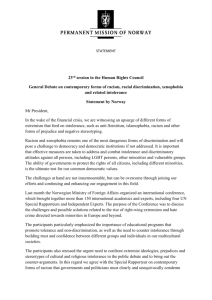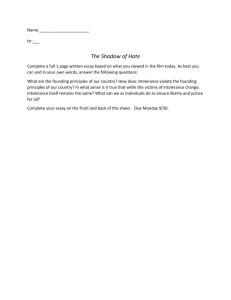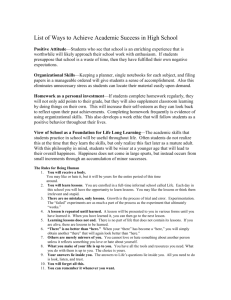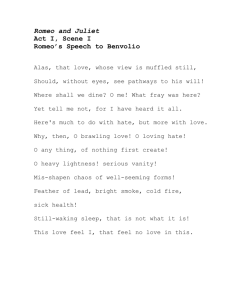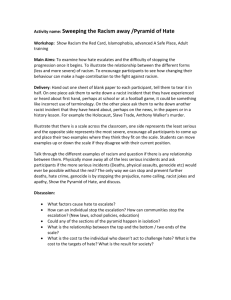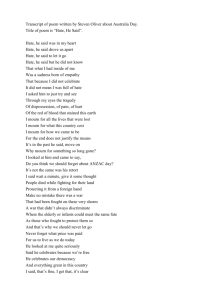The Conference Mobilising, Planning and Networking for
advertisement
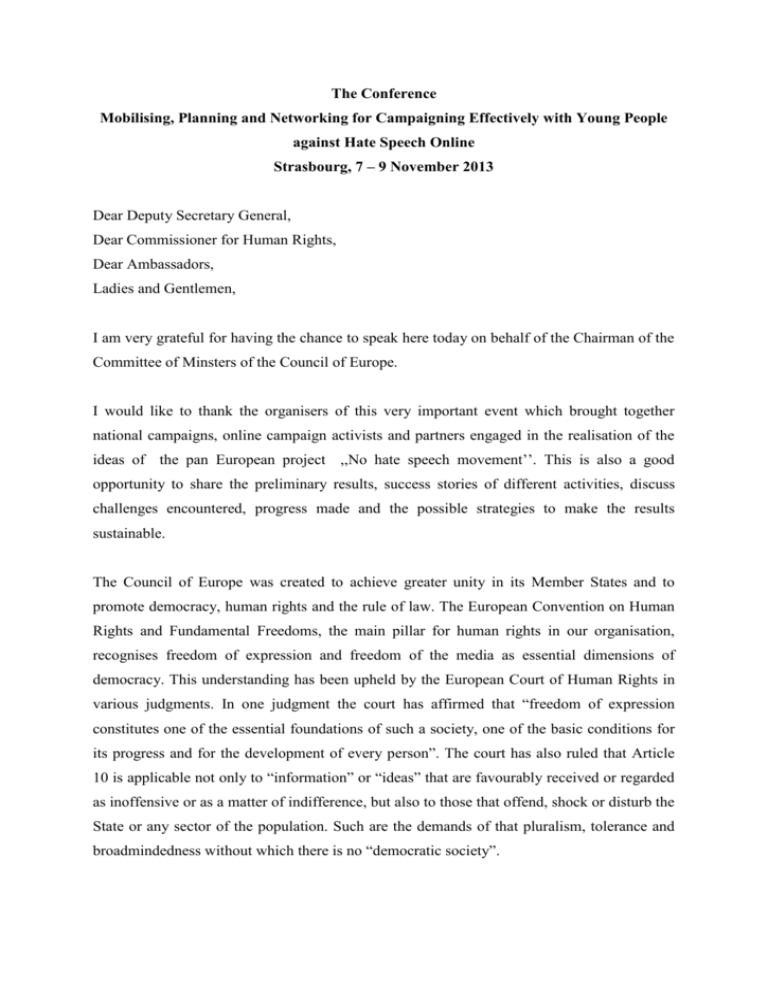
The Conference Mobilising, Planning and Networking for Campaigning Effectively with Young People against Hate Speech Online Strasbourg, 7 – 9 November 2013 Dear Deputy Secretary General, Dear Commissioner for Human Rights, Dear Ambassadors, Ladies and Gentlemen, I am very grateful for having the chance to speak here today on behalf of the Chairman of the Committee of Minsters of the Council of Europe. I would like to thank the organisers of this very important event which brought together national campaigns, online campaign activists and partners engaged in the realisation of the ideas of the pan European project ,,No hate speech movement’’. This is also a good opportunity to share the preliminary results, success stories of different activities, discuss challenges encountered, progress made and the possible strategies to make the results sustainable. The Council of Europe was created to achieve greater unity in its Member States and to promote democracy, human rights and the rule of law. The European Convention on Human Rights and Fundamental Freedoms, the main pillar for human rights in our organisation, recognises freedom of expression and freedom of the media as essential dimensions of democracy. This understanding has been upheld by the European Court of Human Rights in various judgments. In one judgment the court has affirmed that “freedom of expression constitutes one of the essential foundations of such a society, one of the basic conditions for its progress and for the development of every person”. The court has also ruled that Article 10 is applicable not only to “information” or “ideas” that are favourably received or regarded as inoffensive or as a matter of indifference, but also to those that offend, shock or disturb the State or any sector of the population. Such are the demands of that pluralism, tolerance and broadmindedness without which there is no “democratic society”. This being said, and on the basis of Article 10 of the Convention, stipulating that the exercise of this right carries with it duties and responsibilities, the Court has also established that any interference with the right to freedom of expression must be prescribed by law, must pursue a legitimate aim, must be necessary in a democratic society and, finally, must be proportionate to the legitimate aims pursued. The Committee of Ministers took an early interest in matters of hate speech with Recommendation (97)20 adopted in 1997. The Recommendation provides a definition of hate speech that is the main existing definition today: all forms of expression which spread, incite, promote or justify racial hatred, xenophobia, antisemitism or other forms of hatred based on intolerance, including: intolerance expressed by aggressive nationalism and ethnocentrism, discrimination and hostility against minorities, migrants and people of immigrant origin. It also calls on national governments to take appropriate steps to implement the principles annexed to the Recommendation; “ensure that such steps form part of a comprehensive approach to the phenomenon, which also targets its social, economic, political, cultural and other root causes”; where States have not already done so, “sign, ratify and effectively implement” International Convention on the Elimination of Racial Discrimination in their domestic legal orders; and “review their domestic legislation and practice in order to ensure that they comply with the principles” appended to the Recommendation. What is less talked about, is the Recommendation 97 (21) on the Media and the Promotion of a Culture of Tolerance. The recommendation confirms the need to impose legally binding standards concerning the propagation of racism and intolerance without violating freedom of expression and the principle of editorial independence. However, as concerns the promotion of a positive contribution by the media, great care needs to be taken so as not to interfere with these principles. This area calls for measures of encouragement rather than legal measures. The Committee of Ministers has not stopped in 1997 and it has regularly issued texts and recommendations concerning both hate speech and media society. Another recommendation from 2004 on Freedom of political debate in the media, adopted on 12 February 2004, emphasises that freedom of political debate does not include freedom to express racist opinions or opinions which are an incitement to hatred, xenophobia, antisemitism and all forms of intolerance. I must also make reference, of course to the Additional Protocol to the Convention on cybercrime, related to the prosecution of acts of racist and xenophobic nature through computer systems, which entered into force in 2006. This document is of particular importance where it concerns the dissemination of messages of hatred through the Internet, and describes certain acts as criminal offences. I quote these two recommendations not because I want to indulge into legal instruments, but because they represent in fact the two main orientations taken by the Committee of Ministers regarding hate speech: legal measures to sanction hate speech in the respect of freedom of expression and other measures to prevent hate speech and promote human rights. I would particularly like to stress Prevention, which comes with a culture of human rights, comes with education for democratic citizenship. And here as well the Council of Europe is very active. The Charter on Education for Democratic Citizenship and Human Rights Education, adopted in 2010 with a significant input from youth organisations, follows on these footsteps by calling to make human rights education accessible to children and young people. The charter also sees as an essential element of all education for democratic citizenship “the promotion of social cohesion and intercultural dialogue and the valuing of diversity and equality, including gender equality”. Human rights education and education for democratic citizenship are thus very important to raise awareness about and to address hate speech, online and offline. As the No Hate Speech Movement campaign illustrates, the Internet and new media have amplified the scope and dangers of hate speech in its online dimension. The Committee of Ministers is attentive to the need to update the understanding of these texts, including the definition of hate speech, to include for example misogyny and gender-based discrimination and the specific risks it poses to children and young people, especially when combined with bullying. But I would like to assure all of you, who are also carriers of the Council of Europe’s values, that the organisation has been consistently on the forefront of addressing and combating hate speech because it is a violation of human dignity; a violation and abuse of human rights. As I already mentioned youth has a significant role in many of the Council of Europe initiatives. And organisers of this conference are on the right track to empathize the role of the young people who are the main driving force of the campaign. I know from my own country how brave sometimes the initiatives of the youth organisations could be which we wouldn’t allow ourselves as government representatives. It is for me a particular pleasure to welcome the representatives of youth organisations and thank them on behalf of the Committee of Ministers and particularly on behalf of the Armenian Chairmanship. We are always admiring your pragmatic views, innovative ideas and initiatives towards better realisation and visibility of the campaign. Let me also say few words on behalf of the Armenian Chairmanship of the Committee of Ministers of the Council of Europe. Combating racism, xenophobia and intolerance has been among top priorities of the Armenian Chairmanship. Manifestations of racism, xenophobia, intolerance and extremism are not new challenges. However, nowadays, when the perception of distance and time has changed, when the countries have become increasingly interconnected and information becomes momentarily available to millions of people through the Internet, the fight against these occurrences is becoming ever important and demanding. The intolerance and xenophobia violate human dignity, create an image of an enemy within the society, fuels mistrust, thus endangering the harmony of our societies. To this end the Armenian Chairmanship organised the High-Level Conference on Combating Racism, Xenophobia and Intolerance in Europe on 21-22 October in Yerevan which brought together more than 130 representatives from Council of Europe member and observer states, international organizations, including CoE, UN, OSCE, League of Arab States and EU, independent and governmental experts, civil society. The participants of the conference had an opportunity to reflect upon several issues such as expression of racism and hate speech in political discourse, the role of political leaders and civil society in combating such processes, the intensive use of preventive measures, overcoming racial stereotypes, exclusion of manifestations of xenophobia and intolerance, etc. In order to raise the visibility of the No Hate Speech Movement, the Chairmanship devoted a special attention to it during the Conference and called on member states to promote the implementation of the campaign across all the Council of Europe territory. The Armenian Chairmanship welcomed the No Hate Speech Movement campaign launched by the Secretary General and will always support the activities in this framework. The voluntary contribution of Armenia aims at the implementation of the project entitled “Young People Combating Hate Speech in Cyberspace’’. I wish a successful conference, Thank you

